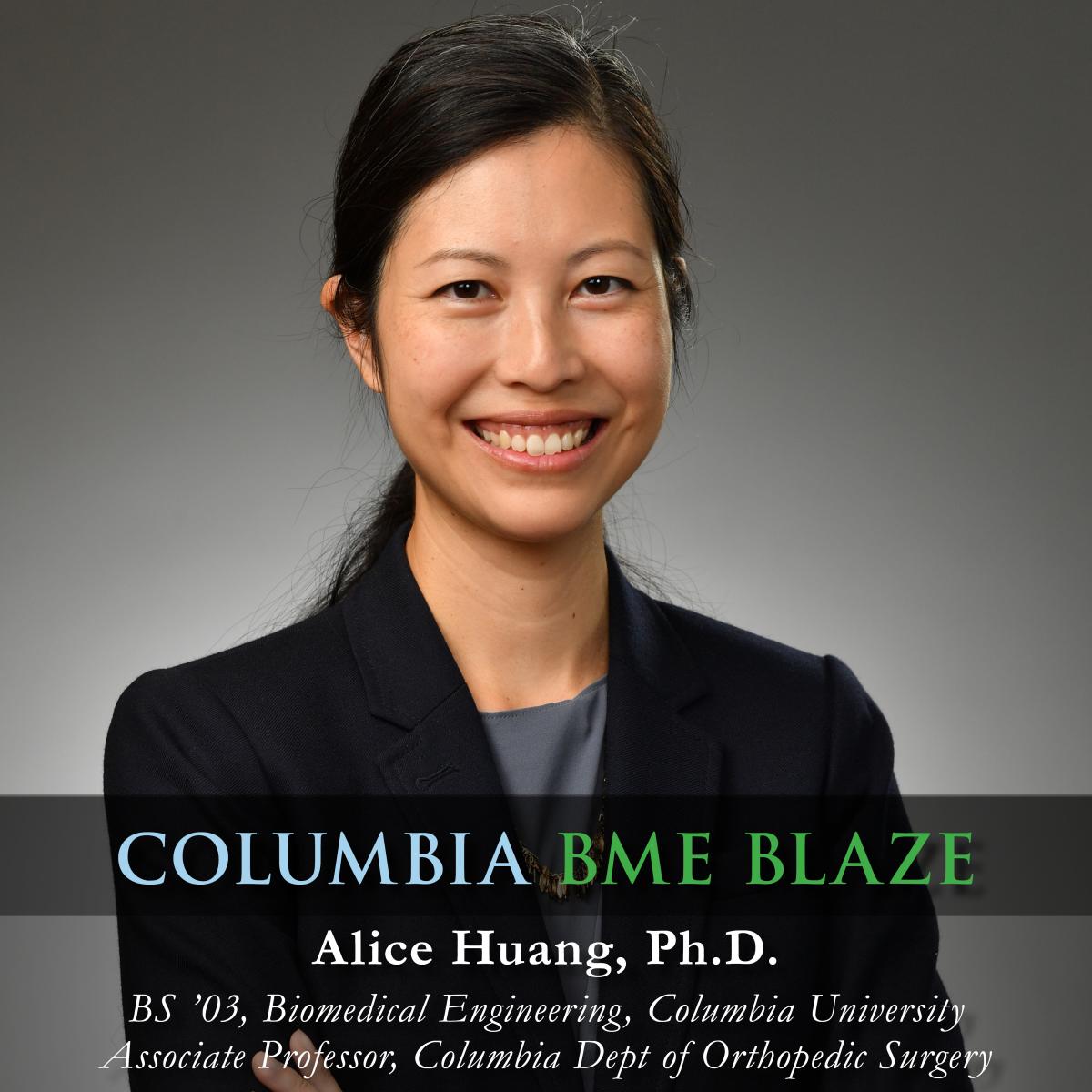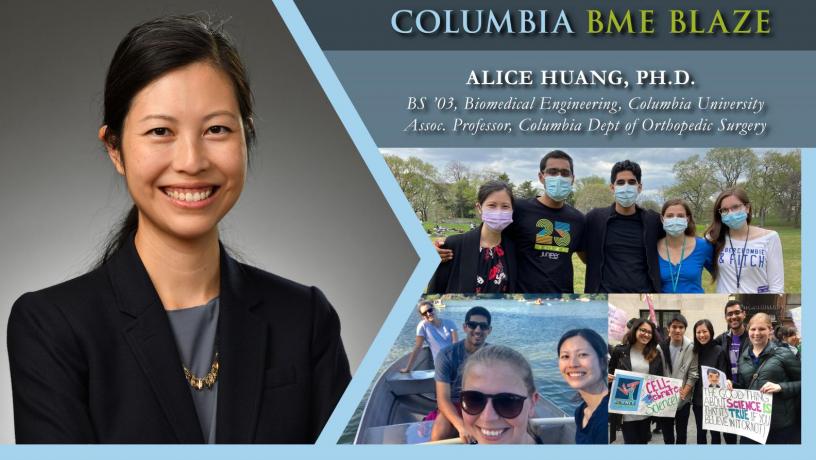April 2022 - BME Blaze: Alice Huang, PhD
In this monthly spotlight, get to know the alumni, students, and scientists of Columbia's Department of Biomedical Engineering. Read what our BME folks are up to, from our labs' latest research, to our students' plans for the future, to our teams' innovations, start-ups and other career successes.
We sat down with Columbia BME alumna (BS '03) and current Columbia assoc. professor of Orthopedic Surgery, Alice Huang, as she reminisced about life as a BME undergrad and told us about her journey to become a Columbia professor! Read below to get to know Dr. Huang!

Alice Huang, PhD
- 1998-2003 BA, Asian and Middle Eastern Studies, Barnard College
- 1998-2003 BS, Biomedical Engineering, SEAS Columbia University
- 2005-2010 PhD, Bioengineering, University of Pennsylvania
Where are you from?
Redondo Beach, CA
What drew you to the field of Biomedical Engineering?
I started off intending to go into Architecture at Barnard but after falling asleep through Intro to Architecture, I realized I needed a different major ASAP. What drew me to Architecture was the idea of working with my hands and building things. I reached out to BME Prof. Clark Hung, who showed me around his lab, and I became very excited about building tissues. I eventually applied and was accepted into the 3-2 program, which allowed me to combine a liberal arts and engineering education.
What is your current role?
I lead a research lab in Orthopedic Surgery at CUIMC. We focus on research related to tendon development and regeneration, using approaches from bioengineering and developmental biology.
Why did you choose Columbia BME?
I was already attending Barnard College and Columbia’s 3-2 program was very attractive in allowing me to pursue all of my interests. Given that my current role requires a great deal of writing, I am very thankful for that liberal arts training, in addition to the strong foundation in engineering that Columbia BME provided.
What were some of your favorite projects/memories from the program?
I enjoyed doing research in Kevin Costa’s cardiac tissue engineering lab. It was my first research experience and was really what set me off on an academic career path. I remember we adapted a subwoofer from Radioshack to function as a bioreactor and stretch engineered cardiac tissues. I loved this creative approach to science and the excitement of collecting new data that wasn’t already known.
What was your proudest moment at Columbia?
I don’t actually remember a single moment – it was so long ago! There were so many different experiences and opportunities that I had and am proud of – doing research, working at the Rape Crisis Center, procrastinating and chatting with friends late at night. Looking back, it was the relationships I made during this time that I value most.
How has your experience with Columbia BME contributed towards your goals?
Columbia BME was absolutely instrumental to where I am today. My undergraduate student advisor (and current BME Department Chair) Prof. Ed Guo encouraged me toward graduate school and directed me toward Penn. The other musculoskeletal faculty (Clark Hung, Gerard Ateshian, Helen Lu) continued to be mentors as I moved along the stages of training and were always supportive. It’s been a real pleasure to return to Columbia and work alongside these amazing faculty who helped launch the department in those early days.
What are your thoughts on the strength of Columbia BME's alumni network and how has that influenced your career path?
The alumni network is incredible, especially in Orthopedic research. Many of the leading musculoskeletal researchers in the field trained at Columbia at some point in their careers. I actually ended up doing my PhD with the first PhD graduate from Columbia BME – Rob Mauck. For my first independent research position at Sinai, I was hired by Evan Flatow and James Iatridis – both Columbia alumni. I don’t think it is a coincidence that so many outstanding researchers came out of Columbia BME. The benefits to having trained here are endless.
Any words of wisdom or tips for prospective BME students?
This is a time of great freedom so don’t be afraid to try new things!
What are you excited about?
I am excited about the research we are currently working on, especially our work related to immune cell regulation of tendon regeneration and our tendon mechanobiology projects.
COLUMBIA BME ACADEMICS
Columbia BME was absolutely instrumental to where I am today...It’s been a real pleasure to return to Columbia and work alongside the amazing faculty who helped launch the department in those early days.

Images (clockwise from top):
1. Pandemic lab group
2. 2017 March for Science
3. Central Park rowboating with lab
